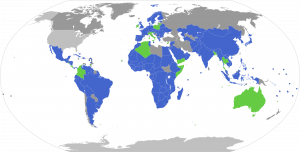Nagoya Protocol
Het Nagoya Protocol is een internationaal verdrag dat zich richt op het regelen van toegang tot en het delen van voordelen van genetische hulpbronnen. Het protocol werd in 2010 aangenomen door de Conferentie van de Partijen van de Conventie inzake Biologische Diversiteit en is in 2014 in werking getreden.
Het Nagoya Protocol is bedoeld om te zorgen dat landen en individuen die genetische hulpbronnen gebruiken om nieuwe producten te ontwikkelen, zoals medicijnen of landbouwproducten, eerlijk en billijk vergoed worden voor hun bijdrage. Dit betekent dat landen en individuen die genetische hulpbronnen leveren, een eerlijke vergoeding ontvangen voor het gebruik van hun hulpbronnen.
Het Nagoya Protocol is van belang voor landen in Afrika, Azië en Latijns-Amerika, waar veel van de wereldwijde genetische hulpbronnen zich bevinden. Het protocol biedt deze landen bescherming tegen oneerlijke uitbuiting van hun hulpbronnen en zorgt ervoor dat zij een eerlijke vergoeding ontvangen voor het gebruik van hun hulpbronnen.
Voor bedrijven zoals Lab Servant die software ontwikkelen voor het laboratorium, kan het Nagoya Protocol van belang zijn als haar klanten genetische hulpbronnen gebruiken in hun onderzoek en ontwikkeling. Bedrijven moeten zich houden aan de regels van het protocol en eerlijke vergoedingen betalen aan landen en individuen die hun genetische hulpbronnen leveren.
In samenwerking met het Nagoya Protocol kan Lab Servant bijdragen aan een eerlijker en billijker gebruik van genetische hulpbronnen en daarmee bijdragen aan de bescherming van de wereldwijde biologische diversiteit.
The Nagoya Protocol is an international treaty aimed at regulating access to and benefit sharing of genetic resources. The protocol was adopted by the Conference of the Parties to the Convention on Biological Diversity in 2010 and entered into force in 2014.
The Nagoya Protocol is designed to ensure that countries and individuals who use genetic resources to develop new products, such as medicines or agricultural products, are fairly and equitably remunerated for their contribution. This means that countries and individuals who provide genetic resources receive fair compensation for the use of their resources.
The Nagoya Protocol is of interest to countries in Africa, Asia and Latin America, where many of the world’s genetic resources are located. The protocol protects these countries against unfair exploitation of their resources and ensures that they receive fair compensation for the use of their resources.
For companies like Lab Servant that develop software for the lab, the Nagoya Protocol could be of interest if its customers use genetic resources in their research and development. Companies must abide by the protocol’s rules and pay fair fees to countries and individuals who provide their genetic resources.
In collaboration with the Nagoya Protocol, Lab Servant can contribute to a fairer and more equitable use of genetic resources and thereby contribute to the protection of global biological diversity.



